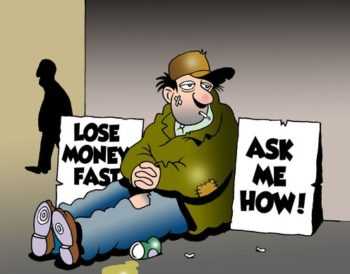2 min read

It is possible to avoid many bad investments.
If you know what “catches” to look out for and which clarifying questions to ask.
Most bad investment scenarios can be avoided by following simple rules.
First of all, you have to avoid emotional and personal investing mistakes, wisely avoid.
Many investors, even the well learned, can confirm they made a rushed and impulsive decision and didn’t avoid a bad investment.
Also, many have made decisions while high on emotions so as to score instant satisfaction.
The danger of making bad investment choices cannot be overemphasized. You can use an extensive set of control strategies that people use to limit bad decisions.
What are some of the bad investment choices you can make?
* Failures of rationality – This represents the lack of possibility to see the bigger picture. The investor considers decisions in isolation and doesn’t include their impact on an entire portfolio.
The consequence is that you can invest too much in a single asset class, industry, Or geographic market. Yes, because you know a lot about it and are comfortable with such decisions.
* Using a short-term decision horizon – when an investor is ignoring the appropriate goal of long-term wealth accumulation.
The favor is short-term returns.
But you are here to stay. Right?
The consequence is that losses are more likely in the short run. Much more than over longer time periods.
People are twice as sensitive to losses as to gains. This behavioral phenomenon is known as “myopic loss aversion”. And their inclination to take short-term risks is too low. So they often make the wrong investment decisions.

* Buying high and selling low – means doing what’s comfortable amidst either bullish or bearish market conditions. The consequence is that when you are buying while markets are high or selling when markets are low is a risky strategy that fails to take advantage of market opportunities. A buy-and-hold strategy turns out to be superior.
* Trading too frequently – this is the result of multiple emotional and personality-driven characteristic. That produces an irrational tendency toward action.
The consequence is that investment costs are higher. As the frequency of making the other types of poor decisions is increased.

The experts recommend these seven self-control strategies. They can help counter your tendencies to make bad decisions and avoid a bad investment. The use of these strategies was not limited to investments and often included other behaviors and other important lifestyle decisions.
Here are the seven strategies and their application to financial decisions:
- Limiting options – Purchase illiquid investments to avoid the urge to sell investments when the market is falling.
- Avoidance – Avoid information about how the market or portfolio is performing to stick to a long-term investment strategy.
- Rules – Use the rules to help make better financial decisions, such as only spending out of income and never out of capital.
- Deadlines – Set your own financial deadlines aiming to save a certain amount of money by the end of the year.
- Cooling off – Wait a few days after making a big financial decision, before executing it.
- Delegation – Delegate your financial decisions with others, allow your investment advisor to manage your portfolio.
- Other people – Use the help of other people to reach their financial goals. Make some appointment with your financial advisor to make and execute a financial plan. Certainly, you don’t want all your money in just one kind of investment. So you can safely choose a single advisor or firm to handle a range of investments.
The stock market’s tendency to produce large gains and losses. So there is no shortage of faulty advice and irrational decisions.
As an investor, the best thing you can do to pad your portfolio for the long term is to implement a rational investment strategy. The one you are comfortable with and willing to stick to.
If you are looking to make a big win by betting with your money, try the casino.
You should be proud of your investment decisions in the long run. In that way, your portfolio will reflect the solidity of your actions.
You would this: Bargain Hunting – The Holy Grail of Investing





